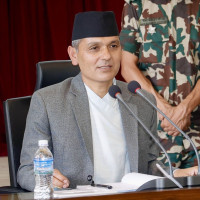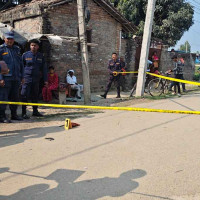- Friday, 20 February 2026
Trade Union Reforms Still Elusive
The State Affairs and Good Governance Committee of the parliament has passed the much-disputed civil service bill, clearing the decks for its passage from the House. The committee arrived at a consensus on several issues that had been debated in the panel for a considerable length of time. A host of critical and controversial issues were on the anvil to be thrashed out, contained in the amendment proposals registered by the lawmakers.
The committee’s work to sort out the issues was made easier by the body headed by the lawmaker Dilendra Prasad Badu, which had representation of the major parties in the federal parliament. Though the process ahead may take time, it is anticipated that the bill will be enacted in the ongoing session of the parliament. The policy and programme of the government, read out by the president, had also pledged that the bill would be passed by the parliament in the ongoing session. If the bill finalised by the committee gets through the plenary session of the federal parliament, civil servants will retire at the age of 60 years, not from the current 58 years.
Major change
Likewise, the bill imposes a two-year cooling-off period after the retirement of civil servants before they can be appointed to any constitutional position. Likewise, a major change envisaged in the bill is that chief administrative officers for local governments shall come under the purview of the provincial civil service. However, the federal government shall depute them until the provinces start their own recruitments. The federal government will depute such officers in bulk, and the provincial governments will assign them to the respective local governments. Such officers can be transferred between the provinces once during their service period.
Moreover, the provincial secretaries will be placed under the provincial governments. However, for the time being, they will be deputed by the federal government. As expected, the provincial principal secretaries will continue to be under the purview of the federal government. The bill has proposed that the additional secretaries will be ranked above joint secretaries and immediately below secretaries. Secretaries, additional secretaries and joint secretaries will be grouped into the gazetted special category. Such a provision indeed existed in the civil service law during the party-less Panchayat regime, but it was discontinued after the restoration of multiparty democracy in the country.
One of the major stumbling blocks in the reform of the civil service has been the dominance of trade unionism. The bill fails to reform trade unionism in the civil service because of the intense pressure from the civil servants to continue it. According to recent reports, representatives of the trade unions affiliated to six political parties, including the ruling NC and UML, had submitted a memorandum demanding the continuation of the trade unions.
There are worries that bureaucracy will continue to be politicised due to their trade union-type associations affiliated to different political parties, which has reinforced their partisan orientation. The challenges to bureaucracy today in Nepal can be classified into three types, which deserve critical appraisal. One of the challenges for which bureaucracy’s efficiency is compromised is the one for which the bureaucrats themselves are directly responsible. This is termed as bureaucratisation. In this case, bureaucrats are using their expertise, knowledge, and political affiliation to fulfill their own interests at the cost of public interests. Sometimes, they make the process of working complex through procedural formalism. This kills the very motive of responsiveness to the people.
Another challenge comes directly from politicians and ministers, though the bureaucrats can be said to be indirectly responsible for this, too. Here, the bureaucrats are getting politicised, sometimes willingly to get some undue favour in return, and sometimes under heavy pressure. In recent years, bureaucrats have shown a marked tendency to carry out the wishes of their political masters without pausing to consider if the contemplated action is in accordance with the law. It destroys the very quality of civil service, such as rationality and neutrality.
Instead of working for the larger public interest objectively, bureaucrats are compelled to work for the party in power for some narrow vested interests. Too much political interference does not allow many honest officials to work for the larger good. If the upright and honest officials refuse to obey the illegal orders of the elected executives, they have to face several problems. The honest bureaucrats are transferred very frequently to the least favoured places or to unimportant posts where there is very little or no work to do.
Public scrutiny
The third challenge to bureaucracy comes in the form of competition with other actors in the production and delivery of services to meet the people’s demands and expectations. Earlier, the bureaucracy had a monopoly on the production and delivery of public services to the citizens. Today, civil servants have to play the competing role with other actors and demonstrate efficiency and effectiveness. In today’s governance, the work of bureaucracy is always under public scrutiny and monitoring.
It is a challenge for civil servants to satisfy the rising expectations of the public and fulfill their demands. Bureaucracy today, therefore, has to work as a negotiator, facilitator, and regulator as well as a provider of services. The new civil service law to be enacted is expected to ensure that it incorporates the provisions which can make bureaucracy competent, responsive and responsible, but also as a network manager of different actors and stakeholders involved in governance and development.
(The author is presently associated with Policy Research Institute (PRI) as a senior research fellow. rijalmukti@gmail.com)














